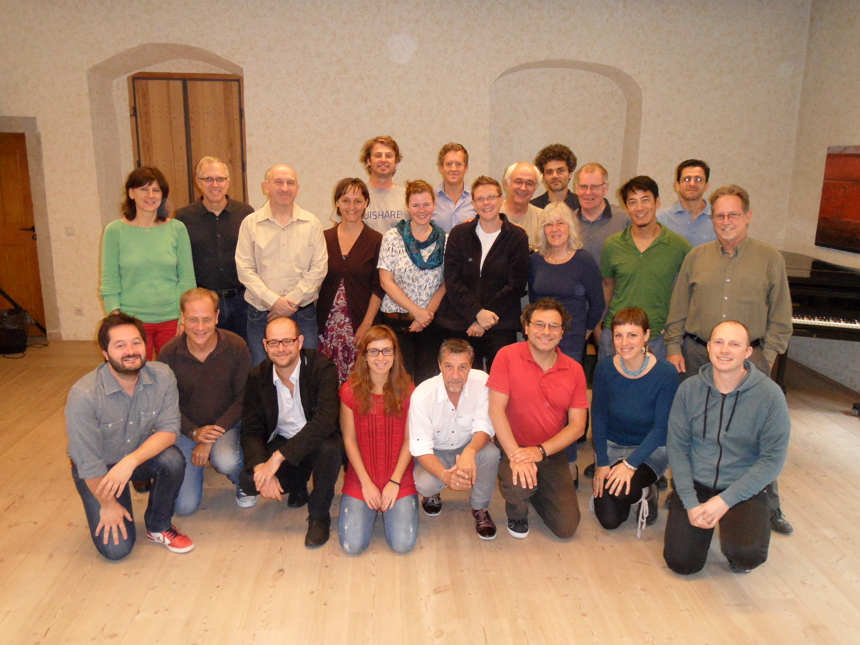by Pat Conaty and David Bollier
“In September 2014, the Commons Strategies Group convened a three-day workshop in Meissen, Germany, of 25 policy advocates and activists from a variety of different economic and social movements. The topic of the “deep dive”: Can leading alt-economic and social movements find ways to work more closely together? Can there be a greater convergence and collaboration in fighting the pathologies of neoliberalism?”
This is the second of two parts. You can find the first part here.
Read the full paper in the Commons Transition Wiki
Download as a PDF
Strategies for a Convergence of Movements
It was immediately clear, following the presentations about the various social movements, that there is enormous potential for greater co-ordination and collaboration. To be sure, each movement has its own distinctive history, geographic clusters, political critiques, strategic approaches, and so on. Yet it appears that the commons orientation and language could serve as a strong basis for broad political and social collaboration – a unifying general theme and sensibility for highly disparate movements.
But how might such a convergence happen? What specific sorts of projects, campaigns and policy agendas could help forge closer, more meaningful collaborations? This was the focus of the concluding session of the workshop.
A key challenge facing all of the movements, noted Kate Swade of Shared Assets, is whether to pursue solutions through pragmatic politics and elections, or whether to try to change the general political discourse and institutional structures over the long term. It seems difficult to pursue both options at the same time. This apparent choice may be especially vexing for the Degrowth movement, whose very name is often seen as unappealing to the political mainstream. (“At least the term can’t be easily co-opted,” quipped one leader at the Fourth International Degrowth Conference in Leipzig, Germany, held days after this workshop.) Is this a cautionary lesson for other movements seeking to change the discourse?
How Do These Movements Overlap – or Not?
While a shared strategy could potentially unite the movements, it may be worth exploring what general approaches the respective movements may share – and then to build on any overlapping approaches. To help identify the commonalities among movements, Silke Helfrich asked workshop participants to rank their movement’s commitment to the following eight missions and methodological priorities:
- Focus on inner dimensions
- Seek to change individual behaviour
- Be an example and inspiration
- Construct new structures
- Reform existing organisations
- Change legal structures
- Reform economic structures
- Focus on theory and the paradigm shift
By aggregating and then averaging these rankings (on a scale of zero to three), this exercise sought to identify key areas overlapping concern among the movements. The rough conclusion was that the movements have the greatest shared interest in items d, e, f, g and h – constructing new structures, reforming existing organisations, changing legal structures and reforming economic structures — with the final one, a shift in theoretical frameworks and a paradigm shift – emerging out of the other four.
Kate Swade argued that one practical way to explore a convergence agenda would be to co-sponsor a joint research to assess which movements are making most progress on these different objectives. Such research could initiate a deeper dialogue among movements on how to co-ordinate further action, and what deserves more emphasis. Jules Peck agreed in general, but pointed out that many of the movements do not directly address ecological concerns, which need additional emphasis.
Peck also described the “mindmapping” that his project, the Real Economy Lab, is undertaking to help identify and categorise the many new initiatives on the future of economics and capitalism. Through desk research and wide consultation, the Lab is developing an information database and taxonomy to act as the basis of a mind-mapping of a wide variety of international projects aimed at developing a new economy ecosystem. The map seeks to understand what various tribes are doing and planning, and why and how. The database will map the priorities of various “tribes” on such things as new economy principles,[13] organization type (NGO, sector-focused, grassroots, etc.), outcomes sought (policy, watchdog, advocacy, grassroots change, etc.), and mode of change (incremental, transformative, stepping stone, etc.). The database will also assess a tribe’s relation to power, profit or not for profit or hybrid, geography, links to others in new economy ecosystem, position on growth, capitalism and alternative economic models (such as market or nonmarket socialism, economic democracy etc.). The Real Economy Lab intends to develop a use tagging, qualitative research and a highly interactive online platform to help the tribes formulate their strategies and collaborations. By demonstrating what is already happening and highlighting gaps in our collective understanding, the Real Economy Lab also hopes to clarify points of convergence and divergence among various movements, and to stimulate consensus- and coalition-building.[14]
It became apparent from the ranking exercise that some movements, including the co-operative sector and Sharing Economy, focus primarily on practical projects and tool-building. Other movements like the Social Solidarity Economy and Degrowth movements concentrate on developing alternative visions and a larger paradigm shift in culture and discourse. The two sets of movements (co-operatives and sharing economy on the one hand, and Solidarity Economy and Degrowth on the other) could clearly complement each other’s respective work. David Bollier noted that there are also potential bridges to be built between the practical and the theoretical by developing richer feedback loops from on-the-ground projects to theorizing about alternative economic structures. Kevin Flanagan of the P2P Foundation noted that there are a number of software platforms that could help host this dialogue; he recommended the recently released Loomio software “because it is a democratic tool for digitally connected communities.”
Frédéric Sultan, a social worker and French activist who works closely with Remix the Commons and the Francophone network of commoners, noted that “each movement seems to want to change the relationships between the state, market and civil society. Can we identify the ‘general interest’ among them and align their separate, specific goals to what they have in common?” But perhaps transformation does not necessarily require a paradigm shift, suggested Thomas Doennebrink of Ouishare in Germany. Consolidation of existing projects might catalyze a transformation, he said, while constructing new institutional structures could amount to mere reform of the existing system. Fernando Cesa Batista, an independent researcher/consultant on the Social and Solidarity Economy and P2P Economy, based in Brazil, wondered if each movement could adopt its own transformational paradigm, or whether they should strive to adopt a common paradigm. This raises a more elemental question, he suggested – What exactly do we mean by a new paradigm?
While it may be impossible to answer these questions now, it seems clear that the lack of an agreed-upon theoretical framework based on shared values leaves practice-based projects somewhat isolated and adrift; some sort of consensus or clarity is needed about what larger structures could bring about the kinds of transformative, root-and-branch change that most of the movements seek. Pat Conaty suggested that starting a dialogue among the movements about first principles could help identify missing connections between system-changing tools and practices on the one hand, and new economic theories and paradigms on the other.
So what are the values shared among these movements? Can we identify them? Mike Lewis, Mark Randazzo and Benjamin Tincq called for one overarching goal, and agreed that a focus on Buen Vivir [the concept of “good living popularized in Bolivia and Ecuador] and the common good could provide a source of mission unity. As John Restakis summed this up: “Buen vivir is inspirational to everyone. It’s also important to give global context to the vision.”
Pat Conaty elaborated on this idea by suggesting a strategic focus on protecting and reproducing the “living economy” – the idea that “real wealth is life, not dead coins, and so we should concentrate on livelihoods and the problem of wealth-sharing and abundance… .What is the prize? The living economy. The problematique, he argued, is the same as in earlier generations – How to share the equity? That’s what the vernacular idea of ‘co-operative commonwealth’ is all about.”
The idea of the economy as a living system, and not a set of mechanical, impersonal forces, lies at the center of an important 2012 essay by ecophilosopher and theoretical biologist Andreas Weber, “Enlivenment.”[15] Drawing upon recent findings and theorizing in evolutionary sciences, Weber argues that free-market economics is based on misleading scientific theories about human nature and rely upon reductionist Enlightenment categories that ignore the creative agency of life itself. Weber argues that we should conceptualize “the economy” as a commons – a complex living system in which humans that have broad capacities to co-operate, negotiate with each other, and show creative agency.
A strategy that sets its sights on such a paradigm shift would find it very appealing to protect, enrich and extend the commons; the economy could be seen not as an extractive machine oblivious to the natural world, but as a living system that must sustain all species. David Bollier suggested that this would provide solid ground for a “movement of movements” to come together. Focusing on “real wealth as life itself” provides a powerful rationale for identifying:
- Ways and means to internalise market externalities (which are harming the environment, communities and future generations);
- Solutions for reducing inequality and social insecurity;
- Pathways to reconnect people with nature and with each other; and
- A new vision of development that goes beyond conventional markets and GDP.
Adopting the commons perspective, Bollier argued, could help movements highlight the connections between “the economy,” the biophysical environment and social communities. All can be seen as integrated into a living system that commoners themselves must co-create and co-manage: a new vision for re-imagining governance, resource management and culture. In developing a discourse of the commons, movements would be able to reclaim a rich legal history and focus on viable practical models. It would also be possible to emphasise our common humanity as transnational tribes of commoners increasingly work together. Jason Nardi agreed and felt that the Social Solidarity Economy activists could find the idea of “solidarity for the commons” as a resonant and rallying vision.
Some steps toward convergence are already underway, as seen in the rising interest in the commons among traditional Social Economy companies. The international conference of such enterprises, Les Rencontres du Mont-Blanc (RMB), which meets in Chamonix, France, every two years, has invited David Bollier (2011) and Michel Bauwens (2013) as scientific advisers, and this outreach has been followed up with engagement with OuiShare (Benjamin Tincq), the French Commoners Network (Frédéric Sultan) and RMB and Crédit Coopératif (Nicole Alix).
Silke Helfrich argued that commoners share an attitude that could be a source of cultural affiliation. While some commoners are conscious of this and self-reflective about their activities and identities, others are not. She conceded that it is possible to have unself-conscious commoners, who perhaps do not use the commons discourse; the key thing, however, is to move beyond market-based relationships and to see the difference between commons logic and market logic. David Bollier added that we must strive to re-embed markets in community, but this requires a shift beyond capitalist markets.
While people may at first act as commoners in non-political ways, managing resources that are important to their everyday identities and needs, they soon encounter the realities of enclosure and the difficulties of protecting commons from the predations of capital. It is for this reason, Michel Bauwens emphasised, that once you begin commons work, you ultimately cannot avoid politics. People who share files, re-use content or use land or water as commons are often accused of violating the rights of property owners (i.e., theft or trespassing) because commoning itself is often criminalised.
Notable Exploratory Projects
Participants identified a range of existing and possible projects by which greater convergence among movements could be advanced.
John Restakis and Pat Conaty presented their work on Synergia, a Canada and UK collaborative initiative to develop a Massive Online Open Course (MOOC) for co-operative and commons education that could operate internationally. First-stage design work has been carried out and a pilot of the MOOC will be launched in 2015. Synergia’s mission is to promote a convergence of commons, co-operative, social solidarity economy and ecological economy thinking and practices. The design work has involved educators, co-operative practitioners and activists from both countries and is supported by a partnership that includes BALTA (the social solidarity economy and universities alliance in western Canada) and U.K. bodies such as New Economics Foundation, Co-operatives UK and Schumacher College.
Silke Helfrich agreed that there is great strategic importance in starting a network of commons educators who are connected to real practice. She cited her involvement with a German graduate program that is developing a commons university model and a newly formed Commons Institute of German commoners. The basic need, she argued, is for “continuous coordination in open spaces with wide bandwidth.”
Another useful tool for commons education is film, noted Mark Decena of Kontent Films, which has produced films for the Edge Funders Alliance in the US. He cited a film that his production company produced on the Climate Justice Alliance, which is trying to build a new economy by uniting those who are fighting “extractive economies” that exploit natural resources, people and cultures. “Our aim is to get funders to see a new economy emerging and relate positively to the change agents,” he said.
Immediately following this workshop, the Fourth International Degrowth Conference in Leipzig, Germany, filled this function quite well. It attracted 3,000 people from around the world, but especially Europe, and served as a kind of open movement congress for many alt-economic movements. At the conference there were two panels on convergence – one that brought together representatives of the sharing economy, peer production and Transition Towns movements, and a second one featuring the perspectives of the commons, the Solidarity Economy and the “Economy of the Common Good” (Austria).
A recurrent question is what the role of the state should be with respect to the commons. Pat Conaty pointed to the possibilities of public/social partnerships of the sort now being developed in many Italian cities. He also cited successful models of the past, such as Letchworth Garden City, in which all the land in a new town or city is put under co-operative ownership and stewardship. In Letchworth, all commercial properties, the energy system, the water services and farmland surrounding the city of 33,000 were all held in common and economic rent captured for local residents and for the common good. Community Land Trusts in the U.S. and the U.K. have used the same ideas to provide affordable housing and workspaces. Now, in Cleveland, Ohio, the Evergreen Co-operatives are demonstrating how these land reform models can work for urban agriculture and for renewable energy. These models can enable town and cities to become resilient and economically autonomous.
The same transformative principles could be applied to money and finance, opening the way for new types of co-operative capital mechanisms for co-investment. For example, public banking in Germany through KfW is funding energy conservation and renewable energy to reduce carbon emissions. Most of the lending in Germany is advanced through public/social partnerships with regional co-operative banks and municipal savings banks.
Based on his work in Ecuador and the examples of Italian public/social partnerships, Bauwens envisions a “partner state” in which governments actively work with social commons in managing shared resources. Through such alternatives, one can imagine the “commonification of public services,” moving beyond many of the problems of centralized, hierarchical state bureaucracies. Christophe Aguiton, a French activist and researcher, agreed with this general approach: “We need a vision, and this is missing. Socialism had a practical vision in the twentieth century. Can we envisage a state rooted in the commons?”
This discussion provoked the question: What is role for regulation? It is widely recognized that industry self-regulation doesn’t work, and many progressives and liberals continue to advocate for centralized regulation as the best way to deal with marketplace and environmental abuses. But the capture and corruption of regulation are pervasive, and the limits of bureaucratic mandates and oversight are also clear. Bauwens said that since use-value communities are not a sufficient answer to market abuses, either, what is really needed are new forms of distributed regulation.
David Bollier noted that some people have proposed the idea of “open API regulation,” in which governments could use open APIs – the Application Protocol Interfaces used by software systems such as the iPhone and Amazon’s platforms – could be used to oversee corporate behavior via real-time data supplied over the Internet. Advocacy groups, citizen-science volunteers and municipalities could also use the APIs to monitor what’s going on in a field (water quality, pollution emissions, etc.) and to supply their own timely, relevant data.
Certainly the question of commons/state relations are becoming timely, relevant issues in many countries such as Spain, Greece and Italy. Podemos and Partido X are actively exploring alternative, commons-friendly policies in Spain, and in Greece the left coalition Syriza is doing the same. George Papanikolaou noted that protests in Greece against the EU and the Troika involved an early period of direct democracy efforts that brought to mind the Occupy movement, but these efforts failed because the question of ownership — a fundamental and transformative question – was not properly addressed and acted upon. More recently the language of the commons has become a unifying discourse among many Greek groups as a practical framework for pointing out where power lies and for seeking democratic change. Cicero’s observation that “Freedom is participation in power” is a crucial insight. Papanikolaou said Greeks now realise that they must build new institutions and develop practical, well-articulated strategies, and that a failure to do so could prove catastrophic. One inclusive way to develop a strategy is open free spaces to debate and discuss social economic and political activities. Festivals are proving to be a good way to do this, as shown by commons festivals held in Greece, Spain and Sweden. The thinking emerging in Greece now is close to that of the Social Solidarity Economy, said Papanikolaou.
Strategies for Alliance Building
So if the commons could provide the glue to link up the movements within what RIPESS has called for as a “movement of movements,” what other problems are holding convergence back? In particular:
- What are the constraints to building a united movement?
- Where are the common ground areas and potential for joint action?
- What needs to be negotiated and where are the blockages?
Nicolas Krausz stressed that “existing organizations don’t have time to be part of collective discussions. We need to fill this gap….We need to work together. Krausz cited the example of Collectif pour une transition citoyenne (Coalition for a citizen transition) in France, which has organized fourteen national organizations (the ethical bank NEF, Attac, renewable energy cooperatives, AMAP, organic food shops, Friends of the Earth France, the new climate justice movement with Alternatiba) to focus on two main goals: spreading their social and ecological transition tools to the largest possible public, and pressing mainstream political parties and local governments to secure and scale up their alternative niches. These kind of intersectional synergies, which embody a more systemic and comprehensive strategy of change, need greater support, he said.
John Restakis argued that “the quality of coordination is fundamental, and it needs to become continuous and permanent to create a common hub for the movements. To ensure success, we need a resource base for continuity and to advance discussion and to sustain joint strategising over years. We need an alliance of organizations and funders to provide ‘seed corn’ investment for knowledge-sharing and institution-building.” Restakis added: “Some key first steps are already underway. The New Economics Foundation in the U.K. has reached out to European groups to discuss systemic change in a programme of activity from fall 2014 to 2016. They are convening scholars and a diversity of organisations interested in alternative paradigms.”
In thinking about ways to move forward, the Deep Dive dialogue and small group conversations came up with alliance-building strategies aimed at nine main areas of collaborative inter-movement work:
- Knowledge sharing. Each movement should regularly share information, plans, news and key policy, strategy and project development documents. Such cross-movement dialogue could begin by sharing reports from the Open Co-operativism and Deep Dive events.
- Collaborative mapping of the emerging new economy. There has already been substantive mapping work of economic alternatives by the Social Solidarity Economy, but this could be augmented by mapping work from the Degrowth movement, commoners, the P2P Foundation, the Post-Growth Alliance and others, including a German/Austrian project, “TransforMap,” with which Silke Helfrich is deeply involved.[16] The Real Economy Lab, directed by Jules Peck of the New Economics Foundation, plans to explore the linkages among a wide variety of new economic movements (see pp. 26-27).
- New means of communication among movements. One proposal is to co-develop a common media magazine that would be published in several languages online. Other ideas include co-developing videos, films, stories, and arts and culture projects, and recruiting diverse writers and celebrities to promote a shared movement vision.
- A common manifesto. Each of various movements could appoint a group of representatives to begin a dialogue and try to develop a manifesto that enumerates shared values, principles and strategies.
- Commons/convergence forum. A steering group should be set up to build trust amongst movements by planning and pursuing shared projects and practices, and celebrating successes through common festivals. (The Real Economy Lab hopes that its interactive hub might serve as a convergence forum for alliance-building.)
- Educational venues should be co-developed that enable movement members and newcomers to see the world differently, share resources, and work on developing practical solutions.
- A politics of the commons should be allowed to evolve through a practical focus on building participatory and civic democracy. Engaging and collaborating with local government, trade unions, new economy, climate justice and other forms of active democracy should become the modus operandi in ways that build decentralised and distributed assemblies of commons.
- Social-public partnerships should be co-developed with local governments and national governments, where feasible, along with participatory policy development systems and participatory budgeting solutions. A democratic assembly of commoners could co-design policy alternatives if serious engagement with the state is not possible.
- Co-operative accumulation infrastructure should be co-developed with co-operative and mutual finance institutions, social economy investors, public banks where they exist and other co-operative crowd funders. Reliance on compound interest and debt-based finance should be replaced with new forms of convivial money and co-operative, debt-free capital.
Suggested Action Points for Moving Forward
The participants focused thinking in their small group discussions on a “Now, Soon and Later” sifting process to identify first steps in moving forward. Among the key Action Points suggested:
- It must be considered tactically if early efforts toward convergence should seek to build an alliance of organisations or if such work should be led by committed individuals. In either case, the leadership cadre should aim to be catalytic.
- We need to identify the sound directional steps that can build the links between and across the movements (Mike Lewis).
- Action circles should be formed to address four key areas – knowledge & know-how sharing; collaborative practice; co-operative capital and money; and communications.
- If property rights and ownership has been taboo as Pat Conaty pointed out, then collaborative practical work on land and capital/money reform could serve to unite the movements in finding convivial, commons-based solutions.
- Work should commence on “ready-made policies” (or policy templates) for advancing the Great Transition and the commons. This should be a collaborative international project to help build and advance “democracy as verb” and displace the unrepresentative state of politics and command-and-control policymaking so pervasive today. This work could develop the legal/policy foundation for social-public partnerships and for a new “partner state” that is designed to foster commons.
- The collaborative development of a international educational movement focused on co-operative commonwealth building is crucially important, as embodied in the Synergia MOOC and a potential commons university-without-walls. It was proposed that this be further investigated through a Deep Dive bringing together diverse movements.
- Work should commence on a mini-roadmap of strategies to evolve and expand through a convergence dialogue among the movements.
- The commons and convergence dialogue could be advanced during 2015 at any number of conferences and other gatherings, as identified in Appendix B. The work being led by RIPESS to host a major Solidarity Economy Europe conference in Berlin in September 2015 will provide a significant opportunity to bring the movement tribes together. We should aim to launch an alliance of movements by then and begin addressing the mini-road map and “movement of movement”
- Finally, work needs to get underway on a website that could serve as a shared space for sharing information and coordination work.. It was collectively agreed that the motto of a new commons/convergence effort could be “From TINA to TAPAS [From “There Is No Alternative” to “There Are Plenty of Alternatives.”]
Conclusion
The Deep Dive confirmed many people’s sense that important synergies could flow from a closer alignment of various economic and social movements, most notably the co-operative, social solidarity economy, peer production, sharing economy and commons movements. There are other movements, too, such as Transition Towns, relocalisation and community economic development, La Via Campesina, and others that could contribute to building a new “movement of movements.”
The final session of the workshop surfaced many practical ideas for exploring how to move forward, ranging from better communications, inter-movement dialogues about first principles, mapping projects, joint strategising at upcoming conferences, new educational platforms and networks, the rediscovery and extension of co-operative commonwealth models, new public/social partnerships, among many others.
Ultimately, further progress will depend upon leadership from individuals within different movements in opening up new dialogues, finding new resources and institutional support, and launching new strategic gambits and projects. Fortunately, there are already many promising convergence initiatives underway. The challenge is to take this goodwill, imagination and momentum to new levels.
APPENDIX A: Workshop Participants
Christophe Aguiton France Orange [telecom co.]; Sorbonne; Marne-la-Vallée
Michel Bauwens Thailand Commons Strategies Group
David Bollier US Commons Strategies Group
Sofia Cardona Spain Cooperativa Integral, Catalunya
Fernando Cesa Batista Brazil Independent researcher/consultant on Social & Solidarity
Economy and P2P Economy
Pat Conaty UK Co-operatives UK / New Economics Foundation
Mark Decena US Kontent Films
Daniela Del Bene Spain EJOLT (Envt’l Justice Organisations, Liabilities, Trade)
Thomas Dönnebrink Germany Ouishare
Kevin Flanagan Ireland P2P Foundation
Silke Helfrich Germany Commons Strategies Group
Nicolas Krausz Switzerland Charles Léopold Mayer Foundation
Mike Lewis Canada Canadian Centre for Community Renewal
Heike Löschmann Germany Heinrich Böll Foundation
Margie Mendell Canada Karl Polanyi Institute, Quebec
Jason Nardi Italy Solidarius, RIPESS
Annemarie Naylor UK Common Futures
George Papanikolaou Greece P2P Foundation, Greece
Jules Peck UK New Economics Foundation
María G. Perulero Spain Goteo
Mark Randazzo US Edge Funders Alliance
John Restakis Canada British Colombia Co-operative Association/FLOK project
Frédéric Sultan France Remix the Commons; Francophone commons network
Kate Swade UK Shared Assets
Benjamin Tincq France Ouishare
Appendix B: Roadmap – 2015 Events That Offer Opportunities for Convergence
March 24-28 World Social Forum/Tunis
April 8-10 Edge Funders Alliance conference, Baltimore
May Meeting of all Integral Co-operatives
May 20-22 Ouishare Fest/Paris
May International meeting of Solidarity Economy/Quebec
May Eco-Networks meeting
August Chaos Computer Club Camp, Germany
August 3-7 Fab11 / Boston [open source electronics projects]
September 7-13 Solidarity Economy & Transformap / Berlin
December 15 COP 21 [UN climate change conference] / Paris
Footnotes
(Continued from Part One)
[13] These include such factors as environmental sustainability, scale and urgency of change needed, well-being maximization rather than growth and wealth, equality, justice, participation and solidarity, economic democracy, sharing, resilience, common cause intrinsic values, sufficiency over efficiency, appropriate scale and subsidiarity.
[14] https://flourishingenterprise.org/jules-peck
[15] https://www.boell.de/en/2013/02/01/enlivenment-towards-fundamental-shift-concepts-nature-culture-and-politics.
[16] TransforMap is an initiative of more than 20 organisations within varying fields of commoning and the collaborative economy that are mapping “alternative social and economic innovation.” Its online map is expected to launch in March 2015. More at https://blog.14mmm.org/transformap-explained.





